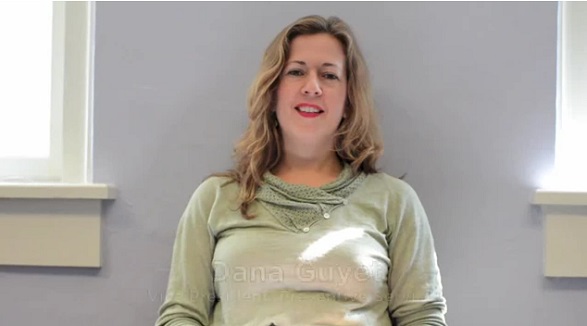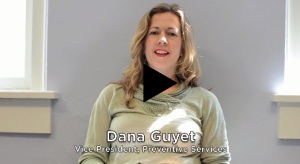Guest Blog: How do we prevent abuse and neglect? The Foundling is on it.
Dana Guyet is the Vice President for Preventive Services at The Foundling. She’s been with us for two years. She has an undergraduate degree in Sociology from Rutgers University and received a Master’s in Social Work from the University of Michigan.
Click to view Dana’s video blog
I’ve always had an awareness of and concern for social justice issues. As a child I was raised to always look for ways to help others and to recognize and appreciate differences in people. My undergraduate studies in sociology reflect this interest and, more specifically, my interest in people in the context of their social environment. At 18, I participated in a mentor program that paired college students with special education children from the local elementary school. I was matched with an 8 year old boy and unlike many of my peers, I had a feeling that simply meeting him and helping with his homework once a week or taking him to lunch wasn’t enough. So, I dug deeper – I met his mother (who also had a keen interest, which I deeply respected, in who I was and the influence I would have on her son) and developed a relationship with his family. Over the years, we remained in contact and our families became friendly and helped each other out. I know this is perhaps an unusual route for a mentee/ mentor relationship to take, and it does not devalue the work that my peers or anyone else does, but it felt more real and substantial at the time. People often forget that giving, volunteering or charitable work in general is a two-way street. I gained so much inspiration, understanding, growth and knowledge from this boy that I was set up to “help” and I continue to lean on those experiences today. In fact, he contacted me again just recently, now as a grown man with a child of his own, just to check in on his “big sis.”
I believe that my relationship with him, my curiosity about how people function in their environment along with my desire to promote social justice, led me to the field of social work. After starting out in New York at the Salvation Army working as a case manager in the late 90s, I ventured to Detroit to get my Master’s in Social Work at the University of Michigan. Upon completing my MSW, I returned to New York, and spent some time working for ACS before joining The Foundling in April 2011. I’m currently the Vice President for Preventive Services here. Preventive Service programs exist to prevent child abuse and neglect before it happens, thereby keeping more children out of foster care placement. In many cases, we can prevent unintentional and intentional harm from coming to a child by providing support and much-needed services in a pro-active manner. Though we accept both referrals from the Administration for Children’s Services (ACS) and self-referrals, the majority of our clients come to us on a strong recommendation, or mandate, by ACS that they receive services to mitigate the possible risk of harm to their children.
The model we use in our child welfare prevention programs is called Functional Family Therapy for Child Welfare (FFT- CW) and it is different from many of the traditionally used methods for several reasons. FFT-CW is an evidenced-based model that works relationally, meaning with the whole family, rather than just the individual child or parent, to empower them to address the issues that present a risk and to create a functional family structure. The model is “evidenced-based” as many of our programs at The Foundling are which means that it has been tested in clinical trials and has proven efficacy. We support families by providing direct intervention and/or linking them to community services, such as mental health care, recreational outlets and other support services, to address any issues they may be facing that increase the risk of abuse or neglect. We work with around 650 families each year in our prevention programs.
FFT-CW is not only proven to achieve positive outcomes for children and families, but it is cost effective because it is a short term intervention of 3-6 months, compared to the traditional service model that might involve working with a family for 1-4 years. Because of this, we can touch more families, and help them develop the skills necessary to move away from being dependent on “the system” – which is the ultimate goal. Keeping children safe in their own homes with their families through preventive services like those we offer at The Foundling has the best long-term outcomes for all involved and costs far less to society than a child who is removed from the home and enters foster care. Sadly, however, the child welfare system exists for a reason and sometimes removing a child from the home is necessary even with the best treatment possible. We apply services on a case-by-case basis and are constantly evaluating the home situations of our clients while they are in our care.
One story a therapist from our Queens program recently shared with me- about a family who had been referred to us by ACS for services- illustrates the model’s effectiveness well. The mother was struggling with serious depression and as a result, their home was in atrocious physical condition when the social worker arrived to meet the family. A very important component of the FFT-CW therapy is to create a bond by engaging the family at the very beginning, in order to gain the trust of your clients. In keeping with this model, our social worker was careful not to respond to the filth with disgust or fear. Eventually she was able to approach the subject with the mother. When she removed a photo from the wall and cockroaches came pouring out as a result of an infestation the therapist stood with the mother without demonstrating any reaction. Later on, the mother expressed that this meant so much to her in that moment and helped her to gain the confidence she needed to address the situation because she knew she had support. Upon returning to the home several weeks into the treatment, our therapist found that the condition had greatly improved and that the family had made this change on their own and by working together. The FFT-CW model aims to instigate sustainable change within the family structure, and help them to function effectively, but on their own terms.
Another of our highly successful evidenced-based programs is Healthy Families -Staten Island (HFSI). This is a fully voluntary, early intervention, child abuse and neglect primary prevention program for families with infants and toddlers in Staten Island that is funded by the NYS Office of Children and Family Services. Pregnant parents or parents with infants up to 3 months old are referred to the program through health care providers, pharmacies, hospitals and other community outlets. To participate in the program either parent or child must live in our catchment area and must meet enrollment criteria. . Fortunately the criteria are very inclusive so it is rare that a family isn’t eligible. When this does occur we will refer them to another appropriate provider. The Healthy Families program has been shown to be highly effective at reducing the rates of child abuse and neglect among participants as compared to the general population. In our HFSI program we work with about 100 families.
Across The Foundling’s Preventive Services programs, we’re striving to meet families where they are, without judgment and to help guide them toward changes that they can apply to all facets of their lives in a positive way. Most importantly, I’m proud that we help protect children and young people from serious abuse and neglect and support families to make positive and sustainable changes.
For more information about The Foundling’s preventive services or HFSI, you can call us at 212-633-9300 or check out our programs and services on our website.




